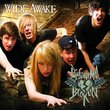| All Artists: Gustav Mahler, David Zinman, Tonhalle Orchestra Zurich Title: Mahler:Symphony No 7 Members Wishing: 0 Total Copies: 0 Label: Sony/RCA Original Release Date: 1/1/2009 Re-Release Date: 1/5/2010 Album Type: Hybrid SACD - DSD Genre: Classical Styles: Chamber Music, Historical Periods, Classical (c.1770-1830) Number of Discs: 1 SwapaCD Credits: 1 UPC: 886975065028 |
Search - Gustav Mahler, David Zinman, Tonhalle Orchestra Zurich :: Mahler:Symphony No 7
 | Gustav Mahler, David Zinman, Tonhalle Orchestra Zurich Mahler:Symphony No 7 Genre: Classical
|
Larger Image |
CD DetailsSimilar CDs
|
CD ReviewsSooooo musical. Very cogent reading too B. Guerrero | 07/31/2009 (5 out of 5 stars) "Anyone already familiar with Zinman's mostly very fine Mahler cycle will know what to expect here, and will find few surprises along the way. In general, Zinman is a tad short on Mahlerian rhetoric and bombast, but very tall on sheer musicality. As always from this source, balances are superb throughout. If all this sounds a bit too safe and sane, let me assure that there are some very nice highlights along the way. The soft, "moonlit" episode in the middle of the first movement, for instance, is simply to die for. The playing of the Zurich based musicians is so controlled throughout, and the series of ascending harp glissandi are exquisitely done. In the second movement, the offstage cowbells are fully audible at the passage where the solo horns play their echoing nocturnal signals to each other (believe me, this is not always the case). In the middle movement scherzo, Zinman observes Mahler's "not too fast" marking, but without also making it sound boring. He achieves this through strict adherence to Mahler's dynamic and phrase markings, as well as bringing all those descending glissandi in the woodwinds and strings out into the foreground. The second Nachtmusik (fourth movement) is beautifully done. As is more often the case these days, Zinman adopts a slightly faster tempo in the fourth movement than conductors of previous generations permitted themselves, thus making for a more logical transition into the blinding C-major sunlight of the finale (Mahler's own description, trust me). And as you might guess, the guitar and mandolin are perfectly audible throughout the fourth movement. If there's a place where Zinman perhaps plays-the-game a bit too safely, it would be in the finale. Like Haitink, Zinman wants to unify tempi across all those variations and sub-sections within the finale, particularly in the last half of it. Yet, those tempo decisions are all good. Better yet, there's plenty of deep bells and cowbells leading up to Mahler's final peroration. That may seem like a silly point, but it helps in lending a sense of the finale - as well as the rest of the symphony - leading up to something overwhelming; almost orgasmic. While I'm not prepared to call this the best Mahler 7th ever, I like this performance very much." A very beautiful and colourful Seventh MartinP | Nijmegen, The Netherlands | 12/20/2009 (5 out of 5 stars) "This was my first encounter with the Zinman Mahler cycle, and it turned out to be a thoroughly wonderful one. This Mahler VII stands out simply for sheer beauty and poetry. Zinman has an unbelievably keen ear for just the right balance and manages to bring out the extraordinary harmonies of this piece to full effect. Listen, for example, to the gorgeous progression in the trombones a few bars after figure 57. If at times the result is too much like chamber music, especially in the Finale, there are always rewards not on offer in other versions. In fact, this reading at least saves the finale from being the monotonously loud and brassy juggernaut that many others leave us with; Zinman's restrained use of full-out fortissimo ensures that the few climaxes he does give us serve as well-placed markers in the musical architecture. Even in the coda he makes sure to place accents in the brass in such a way that the violins remain audible. And his approach does yield one of the most hauntingly demonic readings of the eerie Scherzo ever to be recorded (terrific glissando wailing in the woodwinds!). The fairy tale atmosphere of the first `Night music' and the first movement's pastoral interlude are realized to perfection. Not that other parts of the opening movement aren't on a par, Zinman's reading is highly coherent, energetic, and has a great sense of build-up, a tension wonderfully released in the percussion driven march before figure 62. Zinman's feeling for the tempo giusto is as unerring as his sense of balance. Finally a conductor who doesn't rush the Finale's second theme. And doesn't try to turn the Andante into a grandiose adagio - at Zinman's sprightly tempo for once this deluxe Kafémusik doesn't outstay its welcome. Also, dynamic markings are scrupulously observed, as are other markings that create the inimitably colourful Mahlerian soundscape - e.g., the audible use of open strings where Mahler wants them. The Zürich players need not fear even the loftiest competition and the sound recording is quite excellent: spacious, detailed but unexaggerated. Of course there always remain things to be desired. A weightier bass drum, for instance, and maybe after all a slightly more outgoing brass section in the finale. I do feel that the final pages need a kind of riotous frenzy not quite found here. But this is a truly wonderful recording of Mahler's most enigmatic symphony, that offers individual insights without any wilfulness, and I will happily return to it alongside Gielen and Bernstein (DG). " Zinman, TonhalleZurich: Mahler Sym 7: Seems Too Cool-Headed Dan Fee | Berkeley, CA USA | 04/21/2010 (5 out of 5 stars) "By now we are pretty far into Zinman's complete Mahler symphony series. He's released all the symphonies in order so far, leading the same excellent Tonhalle band in Zurich where he is Music Director. The series has really outstanding super audio surround sound. No surround cinema gimmicks; just warmth, vivid tone colors, and enough air around the whole band playing full tilt or solo that the shine and the virtuoso technique of the Zurich band departments comes through, gangbusters.
The seventh symphony still remains the orphaned challenger among the rest. It is notoriously difficult to bring off. Many performances err on the side of being too literal (thus deficient in that core of fantasy that one infers must run all through the work, with two movements titled, Night Music); or err by being so free-wheeling that unleashing the fantastical obscures the composer's claim that he was, indeed, writing yet another cosmos-embracing symphony. The dipping oars motif that opens the first movement is etched very clearly, very literally here. That seems to predict that this new Zinman reading will likely err on the side of literalism? If erring? Indeed, as a Mahler conductor Zinman seems comfortably tilted towards cool-objective attitudes or manners? (Think Erich Leinsdorf, George Szell, Bernard Haitink, Claudio Abbado, Pierre Boulez, Benjamin Zander ... with the polar opposites interpreters all being freer, hotter, as in Leonard Bernstein, Klaus Tennstedt [focus, those live LPO recording sessions], Willem Mengelberg, even Hermann Scherchen at times.) If a listener settles back, expecting Mahler played with cool literal-mindedness, however, this reading will offer up plenty of surprises. The Tonhalle band manage astounding virtuoso riffs, often. It just may sink in that what other bands and other conductors express by rubato and hot emoting, Zinman and Zurich may still yet reveal in the ever-shifting parade of musical colors, textures, and metamorphosing phrases of this most mercurial of Mahler works. I confess I have to be in a certain frame of hearing for this type of Mahler reading to move me. I'm more likely to be swept up in the freer, more emotional approach - but not always. Some middle-way performances are among my favorite seventh symphonies - with the Bernstein/NYP/DGG lifting high above all the rest so far because the second Bernstein reading just keeps morphing and changing and morphing again, all the way home. As if a Bachian polyphony obtained in this Mahler symphony above all, with deep anticipations of what the Vienna Third School composers would later tag, constant variation-evolution. Add Zinman and Tonhalle to those fond neighbors, Bertini in Cologne, Levine in Chicago, Klemperer in London? In Zinman's take, the more relaxed sections in the middle three movements sound more like Robert Schumann and less like Franz Schubert, if those associations apply. Busy sections have a Lisztian vigor, wild, gypsy. The brights and shadows cast in this odd work are all there, I think. The first Night Music is more fantastical in shapes and colors, preparing for the Hallows' e'en scherzo that sits right in the middle of five movements. The fantasy is Brothers Grimm tales stuff; Des Knaben Wunderhorn folk materials brought out after sundown as light fades, like familiar yet vaguely uncanny ghost tales we tell around a flickering outdoor camp fire. The contrasting sections remind us of formal civilization and family life, briefly touching base with reassuring forward motion and soothing warmth of good company. Then that center stage horn soloist and the lower woodwinds lead us right back again, into shadowy worlds where we whistle in the dark through higher, more piercing woodwinds, not quite sure of our grasp on being safe, after all. The touches of Vienna schmaltz revolve slightly off kilter, undeniably a tad menacing - like an unnamed precursor of Ravel's later orchestra fantasia, La Valse. We march around a bit, acting like good Boy Scouts and Girl Scouts, surrounded by flashes of darkness and mystery, fearsome. After this first Night Music, the Scherzo is unleashed to rattle its skeleton bones even more freely. The insistent scout marching of the prior movement yields to the endless, relentless whirl of fate's wheels. Our suggested landscape is no longer reminiscent of innocent childhood faced with blind-incomprehensible human suffering; but a more inward, grown-ups panorama, vision of human culture and trained human reason faced with all the things so far beyond human control, going bump in all the nights. Strong, lyrical string gestures replace those higher woodwinds that reached back towards good spirits. We adults together can sing affirmative song phrases, without quite forgetting that we have read Lord of the Flies, everyone and each one. That landscape of shadows is as much inside us, as surrounding us on a dark night. The Vienna touches of Schmaltz also return, keener, whirling, slightly more off kilter, sharpened. Ah, the bravado of the grown-ups. What to do without it? What to do when we cannot fail to see through it? Hints of fear, pain, loss melt into sung phrases that sound like lament, lamentation that is human promise of slow healing into maturity, seasoned. Oddly again, this prepares us for the second Night Music which is more shot through with melancholy, and a persistent-open charm of folk materials. Memory, regret, nostalgia, longing, even saddest of our being together with companions who keep us company - feed inevitably into the hidden sense of human survival revealed bare in the face of frank tragedy - humanizing. The closing finale bursts vigorously into this musical flow of first Night Music, Scherzo, and second Night Music. Busy life is right back on the doorsteps, no matter what we have survived, have suffered. A string of contrasts fills out this Rondo form. Episodes suggest bustling daily life, folk charm, and the real building point seems actually to be the polyphony fleshing out through all the Rondo sequences returning. Home harmonies seem to be shifting beneath our feet, constantly. (This is an aspect in which the second Bernstein reading excels.) Martial touches, Vienna Schmaltz touches heighten motion and color without framing center stage as the only main musical focus; that emerges as the interplay of many themes coming all together, ever intertwining, transforming. The success of this close, if it be - is that its reach encompasses, back to Bach, forward to Webern? If you are a die-hard devotee of the hot-blooded view in Mahler, I do not think this Zinman-Zurich Mahler seven will quite get you there. It culminates with too persistent a sense of modernity, for all that. The bells and perorations of its last pages strike a crescendo of the building polyphony and forward motion in western classical music. We've been through quite a lot. We still have as many questions as we have answers, that sort of finale. This reading adds up to something as modern and unfinished an intellectual or expressive project as Darwin's Theory of Evolution in the cosmos that Mahler seems always to have aimed for a symphony to embody. If you can take Zinman's way, however, this reading surely stands tall, an exemplar. Five stars. Really fine sound, super audio surround channels, too." |

 Track Listings (5) - Disc #1
Track Listings (5) - Disc #1



